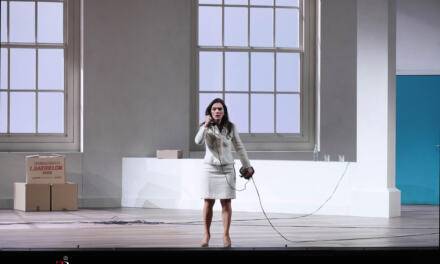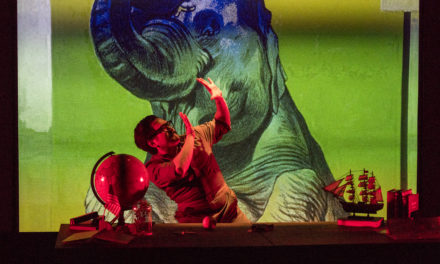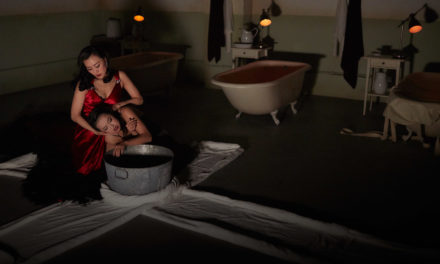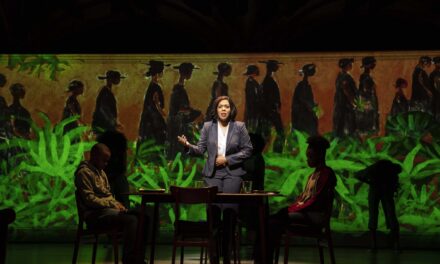The detailed open-plan kitchen that greets you as you take your seat at City Theatre’s production of The Roommate might signal to you that you are about to watch a play that mostly lives in the “real world.” Alternatively, it might make you suspect that what’s on offer is more like a television sitcom. As it turns out, both of these impressions are correct: The Roommate is a play that seeks to explore very real dilemmas but does so with a plot that has about as much credibility as an episode of, say, The Big Bang Theory.
Indeed, director Reginald Douglas seems to have had that show–or a similar one–in mind when he conceived of the production’s opening moment and its scene transitions, which involve the lights on stage dancing in rhythm to pop songs like Run The World (Girls) and Girls Just Wanna Have Fun: they peppily punctuate the action of the play in a manner reminiscent of the fast-cut editing in TV-world. Given that much of the play’s skillfully crafted dialogue also has the surprise comic punch we often see on the small screen, it makes sense that Douglas chose to embrace the script’s sitcom qualities.
But we don’t go to the theater to watch TV, and although I found myself laughing heartily throughout this comedy–and also deeply admiring the excellent character work by both Tamara Tunie and Laurie Klatscher–in the end, the play’s disconnect from plausibility left me puzzling over its purpose.
The big kitchen belongs to Sharon (Tunie), a divorced fifty-something woman who has decided to take in a roommate. Robyn (Klatscher), has just moved to Iowa from the Bronx. The first few scenes make good comic hay out of their odd-couple dynamic: Sharon is rule-bound, provincial, and staidly conventional in all dimensions, while Robyn is laid-back, cosmopolitan, and free-spirited. Sharon’s the kind of lady who goes to church and does book group; Robyn is a vegan lesbian who grows her own marijuana. Sharon has a grown son living his best life as a fashion designer in New York (not gay, she insists, but Robyn, and we, suspect otherwise) whom she pesters incessantly on the phone; Robyn is estranged from her grown daughter, a fact she doesn’t want Sharon to know. She keeps other things secret, as well, at least for the first few scenes, such as the little fact that the reason she’s moved to Iowa is that she’s trying to leave her former life as a grifter, thief, and drug dealer behind.
It’s when Sharon finds clues to Robyn’s dicey past that this play flies off the credibility rails. When Robyn confesses that she used to run a phone scam that bilked gullible people out of their money, Sharon suddenly wants to try being a bit naughty herself and asks Robyn to teach her so that she can con one of the ladies from her book group. Soon, Sharon has fully lost her moral compass (I won’t spoil the plot with further details), while Robyn has been dragged right back into the life of crime she came to Iowa to escape, losing all hope of reconnecting with her daughter in consequence.
None of this passes a probability sniff test. According to playwright Jen Silverman, it’s not supposed to, but the result is that the genuine needs that drive the characters’ actions–their loneliness and lack of purpose in a world that renders middle-aged women invisible–are obscured by the play’s cavalier attitude toward criminal behavior. The take-home seems to be that for women of a certain age, freedom lies in cheating your friends and stealing from people you meet on Match.com; that doesn’t feel like any world, real or otherwise, that I’d want to inhabit.
Yet where the play itself falls short on the plausibility front, the performances by Tunie and Klatscher are some of the best, and most credible, I’ve seen this season. You can tell that these are two actors who are at the top of their game, playing off each other with laser focus and exquisite comic timing. Klatscher’s Robyn dresses like a hippy-dippy flower child, but she’s straightforward in affect: much as she’s a professional con artist, she never actually lies to Sharon, but rather simply evades answering where she can. Klatscher makes clear with every choice that Robyn is a person who is simultaneously hiding everything and nothing. Tunie physicalizes Sharon with an awkward gait that tells you all you need to know about this Midwestern woman–her center of gravity is in her butt, as if she’s always holding something back. And while the gestalt of Sharon’s journey didn’t fully add up for me, from moment to moment Tunie made her character’s decisions feel real and grounded. I realize that sounds contradictory, but it’s a testament to the skill of these two actors that I fully bought the realness of the people they were portraying, even as the plot made me think that they were living in TV world.
This article was originally posted in The Pittsburgh Tatler on March 12, 2019, and has been reposted with permission.
This post was written by the author in their personal capacity.The opinions expressed in this article are the author’s own and do not reflect the view of The Theatre Times, their staff or collaborators.
This post was written by Wendy Arons.
The views expressed here belong to the author and do not necessarily reflect our views and opinions.


















